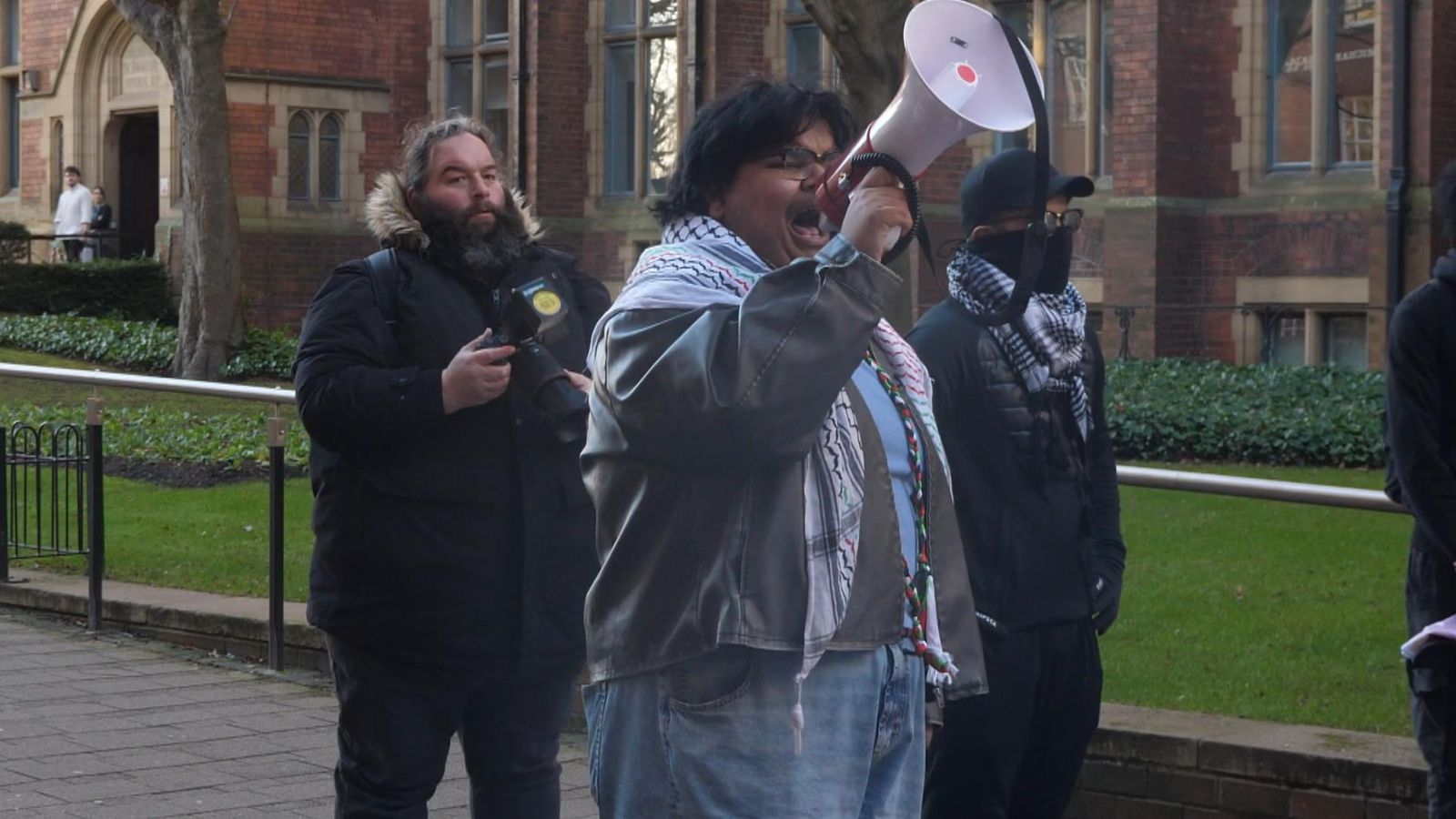U.K News
New evidence shows how UK student protests about Gaza were handled by police and universities

Camping, Chaos, and Confrontation: The Storm Over Gaza Protests in UK Universities
In 2023, UK universities became the battleground for a wave of pro-Palestinian student protests as thousands of students rallied against the war in Gaza. The demonstrations often began peacefully, with students pitching tents on university greens, creating makeshift encampments. However, the situation quickly escalated, with universities, police, and even private surveillance firms becoming involved in managing the protests. New evidence uncovered by Sky News and Liberty Investigates reveals the scale of this response, shedding light on how universities policed the protests and the consequences for students and staff.
Universities, Police, and Surveillance: The Scale of the Response
Through Freedom of Information requests to over 150 UK universities, Liberty Investigates found that at least 40 universities discussed Gaza protest activity with police or private intelligence organizations. Thirty-six universities had direct communication with the police, while 13, including the University of London, Cambridge, and Manchester, discussed protests at meetings with law enforcement. Furthermore, 28 universities launched investigations into as many as 113 students and staff for alleged disciplinary breaches linked to their pro-Palestinian activism. Emails disclosed by more than 20 universities also revealed collaboration between campus security departments and police to monitor protesters, with some universities using intelligence from private security firms.
Despite these findings, 47 universities refused to provide information, citing confidentiality concerns. Most universities also declined to specify the reasons and outcomes of the disciplinary investigations, leaving many questions unanswered about how these cases were handled.
Antisemitism on Campus: A Growing Concern
Amid the protests, concerns about antisemitism on university campuses have also risen. The Community Security Trust, a charity that protects British Jews from terrorism and antisemitism, reported a fivefold increase in antisemitic incidents on student campuses since the 7 October 2023 Hamas terrorist attack on Israel. Dave Rich, the charity’s director of policy, expressed that it would be concerning if universities had not taken disciplinary action against students, as this would suggest they were not adequately addressing anti-Jewish hatred.
Students like David-Lior Banoun Rappaz, an undergraduate at the London School of Economics, and Dov Forman, an author and activist, have spoken out about feeling targeted and dehumanized on campus. Forman emphasized that while universities should uphold freedom of speech, this must be balanced with the safety and dignity of Jewish students.
The Newcastle Incident: Police Tactics and Student Safety
One incident that has left a lasting impact on students occurred at Newcastle University on 29 May 2023. A peaceful rally turned chaotic when police used what students describe as "heavy-handed tactics" to break up the protest. Footage obtained by investigators shows over 40 officers, including dog handlers, attending a building occupied by students. Police were seen pushing and struggling with protesters, drawing batons as the situation escalated. Some students were dragged from the building, and one student was hospitalized after having a fit.
Students involved in the protest, including Ivy and Hana, shared harrowing accounts of their experiences. Ivy showed photos of bruises on her arm, which she claimed were caused by police grabbing her, while Hana, a medical student, described how she was trampled by the crowd and injured her knee. Both students expressed feelings of terror and no longer feel safe on campus.
Academics at Newcastle University have called for the university leadership to explain the handling of the incident. The university defended its actions, stating that there were "legitimate concerns for public safety" and that it was necessary to contact the police. Northumbria Police also released a statement, emphasizing that their primary concern was the safety of everyone involved and that they would not tolerate protests being used as a means to commit crimes.
Balancing Freedom of Speech and Safety: The Universities’ Perspective
Universities UK, which represents 141 universities, has emphasized its commitment to balancing freedom of speech with safety. The organization defended universities’ right to police protests and collaborate with police, insisting that such actions are "occasionally" necessary and must be proportionate.
However, some students and activists feel that universities are using disciplinary processes to stifle dissent. Suffian, the head of the Palestinian Society at Leeds University, was investigated for two months for his involvement in unauthorized protests and leading chants. He argued that there is no "right way" to protest and that students should not be disciplined for speaking out on issues like the Gaza conflict. Suffian ultimately received a formal warning, but the university decided not to take further action.
The University of Leeds stated that it balances the rights of protesters with the need to ensure the safety and well-being of all members of the university community. The university emphasized that students who engage in misconduct may face disciplinary action under its clearly communicated codes and regulations.
‘We Have a Right to Speak Out’: Student Activism and Its Challenges
The protests and their aftermath have left many students feeling unsafe and silenced. For Suffian and others like him, the right to protest and speak out is fundamental. Suffian, who was investigated for his activism, believes that universities are using disciplinary processes to discourage students from participating in protests. He maintains that no child should be a "child of war" and that students have a moral obligation to voice their concerns.
As universities navigate the complex landscape of balancing free speech, safety, and addressing concerns about antisemitism, the experiences of students like Suffian, Ivy, and Hana highlight the challenges of creating an inclusive and secure environment for all. While universities and police defend their actions as necessary to uphold order, students argue that their rights to protest and express their views are being unfairly restricted.
The ongoing debate raises important questions about the role of universities in addressing political conflicts, the limits of free speech, and the responsibility of institutions to protect the safety and dignity of all members of their communities.


















